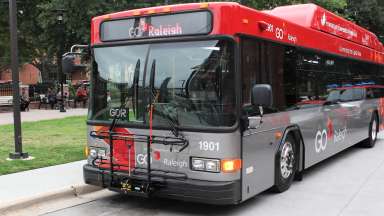Reliable, affordable transportation is critical for economic opportunity and community prosperity for the entire Raleigh community. Shaw University’s Courageous Community Conversations report identifies the importance of excellent public transportation and its potential to positively benefit all Raleigh residents and our collective future. Here is how the City of Raleigh is working to address the needs of residents.
Micro-transit is a form of on-demand responsive transportation - think Uber or Lyft. This service uses a minibus that is shared by several passengers and offers a highly flexible schedule. It is a good solution for areas with low population density. Raleigh is exploring options for implementing micro-transit.
Dynamic Routing is a broad term that references transit options with varying schedules and/or route alignments. These variables are developed to meet a variety of passenger needs. Dynamic routing can address special work-shifts or venues with special events during irregular days and times. Dynamic routing can be used in a micro-transit setting or with the use of existing 40-foot transit buses.
GoRaleigh used dynamic routing in the early 2000s to provide new transit coverage in areas of east and north Raleigh. These services were ultimately replaced by regular fixed routes as transit became more popular and traditional fixed routes provided a greater passenger-per-hour potential. We are currently using software to schedule trips based on similar geographic locations and time needs. This approach allows the service provider to be more efficient with equipment and thus allows more opportunities to provide service.
Bus Stop Shelters
GoRaleigh, Raleigh’s fixed route bus service, provides bus stops along each transit route within the city. Of the approximately 1,238 bus stops 52 percent are in communities of color.
It is Authority policy that a shelter and bench is warranted at bus stops when there are at least 10 boardings a day. Special facilities, to include a shelter and/or a bench may be provided at hospitals, clinics, senior centers or parks and recreation facilities serving seniors or persons with disabilities regardless of the average daily boardings. Bus stops in or adjacent to Raleigh Housing Authority, DHIC and Habitat for Humanity housing shall also be waived from the 10 boardings a day threshold.
You can view all of the GoRaleigh bus stops and amenities here.
The Wake Transit Plan provides about $2 million in funding annually for bus stop improvements. This funding allows for construction of about 60 new shelter improvements each year. GoRaleigh staff uses an equity analysis tool, as required by the Federal Transit Administration, to ensure equitable distribution of site improvements.
Free City Buses have been operating with a suspended fare since early 2020 due to the Covid-19 pandemic.
Prior to the pandemic GoRaleigh offered free fare to all:
- Senior citizens
- Children 12 years old and under
- Teens 13-18 years old with a Youth GoPass
Many local employers, schools and universities participate in the GoPass programs offered by GoRaleigh. This employer, college, or university -paid benefit offers free transit at no cost. Prior to the suspension of fares, 32 percent of daily ridership rode the bus at no cost using GoPass programs.
GoRaleigh also offers a 50 –percent- discount to anyone holding a Medicare Card. This discount provides reduced fare options for another 12 percent of all riders.
